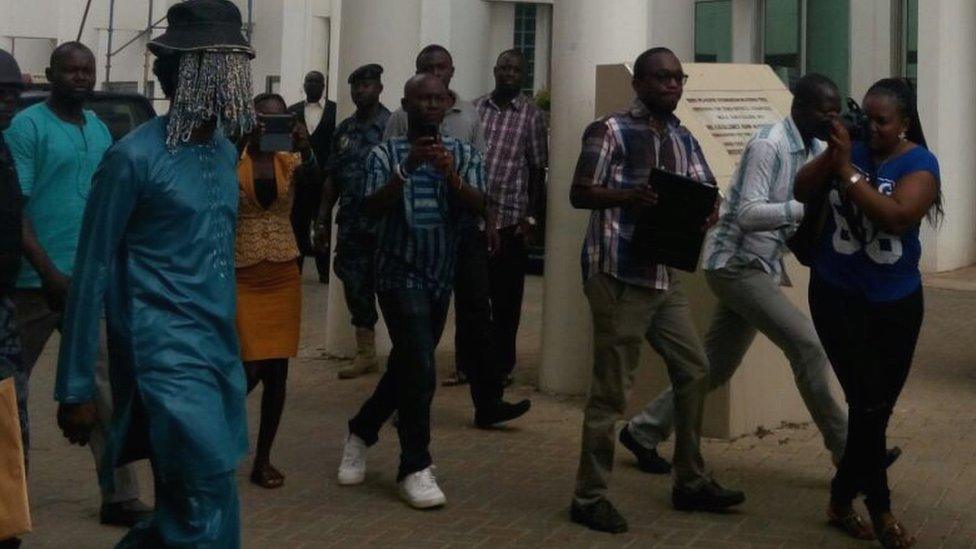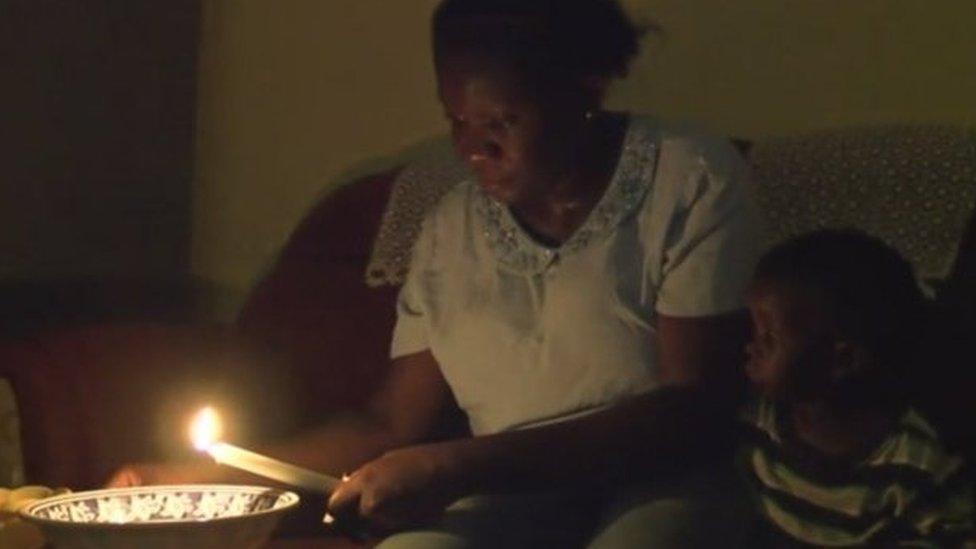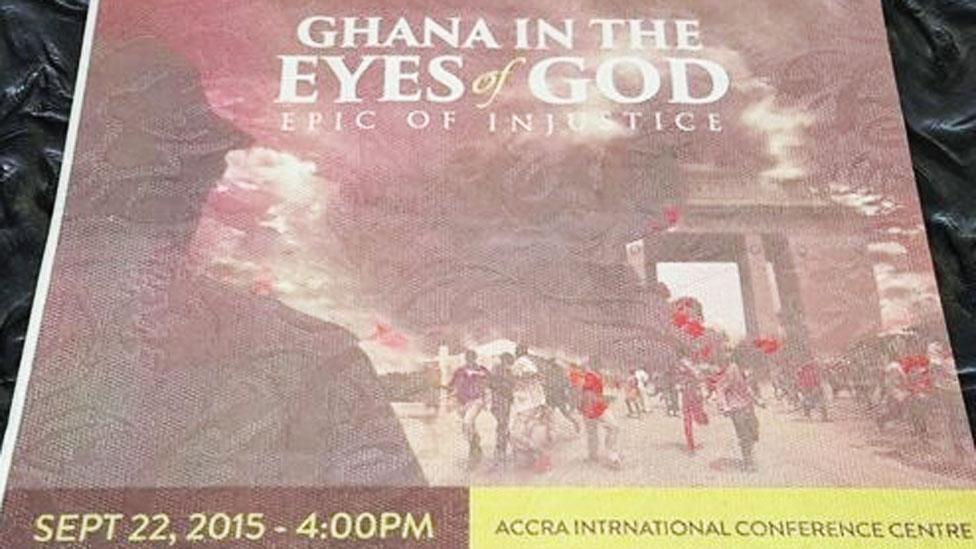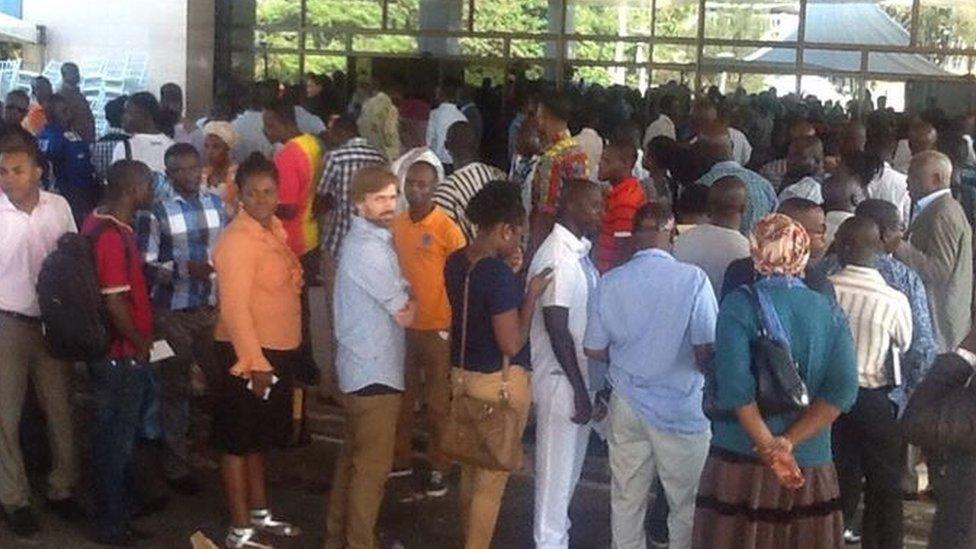Letter from Africa: Ghana's fondness for creative language
- Published

Ghana is gripped by the latest revelation by the country's famous undercover reporter
In our series of letters from African journalists, Ghanaian writer Elizabeth Ohene ponders how creative language and humour help keep people's spirits up in her homeland.
Faced with a difficult situation in Ghana, our coping mechanism involves trying to make a joke out of the situation.
Thus, when we have had problems with unreliable electricity supply in the past three years, we have tried to find the funny part of groping in the dark and food going bad in fridges.
We created a word, "dumsor", to describe the phenomenon. The literal meaning is "off-on" (dum means off; sor means on in the local Twi language).
Recently there was a lot of excitement among the inhabitants of the Ghanaian cyber sphere when "dumsor" made it into Wikipedia, external and entered the lexicon of social media.
It was felt here that "dumsor" had graduated from a recently manufactured word that described a very local phenomenon of the lights going on and off to an internationally accepted word to describe power outages in a challenged economy.
Thus far "dumsor" has largely remained a noun, as in "we have dumsor", and it is used as an exclamation, as in "oh, (swear word) dumsor!".

In the future "dumsor" may be used as an adjective or verb, says Elizabeth Ohene
But I also see possibilities of it being used as a verb, as in "I couldn't write the article because we were dumsored yesterday", and as an adjective, as in "it was a dumsor week".
Since the phenomenon of "dumsor" is not exactly a Ghanaian invention, and indeed our Nigerian cousins would claim a much longer and deeper experience of unreliable power supply, I can expect some resistance to our claim to copyright the word that describes the phenomenon.
But if someone thought "dumsor" was going to be the most interesting contribution Ghana would make to the introduction of new words, that would be a reckoning without reference to our ingenuity.
Bizarre disguises
As some people might have heard, we have been in some turmoil here recently as a result of alleged goings-on in our judiciary.
Anas Aremeyaw Anas, a young man who is probably our best known investigative reporter, has done an expose on the judiciary that is shaking the foundations of our establishment to its very core.

Elizabeth Ohene:

"The only way we can find to cope with the trauma is to find a way to make a joke out of the tragedy"

His method of investigation has involved going undercover, adopting various disguises and secretly audio- and video-taping his subjects.
He has been in factories, at the borders with customs' officials and in other public offices.
He has gone undercover in a children's home and exposed abuses which shocked the whole country.
The disguises he adopts are usually so bizarre I have often wondered how he gets away with it.
I have no idea what disguise he adopted for his most recent enterprise but he has filmed members of the judiciary allegedly taking bribes to interfere with the course of justice and set criminals free.

TV presenters have been dressing up like Anas Aremeyaw Anas, who hides his face
Up until Tuesday, we had only seen juicy trailers and read transcripts of secretly recorded conversations that allegedly compromise the integrity of some high court judges, circuit court judges, magistrates, court clerks and other officials.
Lawyers for 14 of the accused judges have denied the allegations, while the others have not yet commented in public.
As can be expected when lawyers are part of the dramatis personae, there have been lawsuits flying all around and desperate attempts made in the courts to stop the airing of the film and stop the impeachment process of the named judges.
Traumatised crowd
The film finally premiered at the International Conference Centre in the capital, Accra, on Tuesday evening. There was serious gridlock on Accra's streets and the queues to get in were amazing.
It was a traumatised crowd that emerged from the viewing.

Anas Aremeyaw Anas' film screened on Tuesday night despite attempts to stop it

Many people queued to see the film
There have always been rumours of corruption within the judiciary, just as there are persistent rumours of corruption among politicians, policemen, journalists, teachers, religious leaders, customs and immigration officials and every other part of our society.
But seeing judges allegedly taking money to let criminals go free is turning out to be a most traumatic experience for Ghanaians.
As a friend has reminded me, the last time the whole of Ghana was united in such shock was when three high court judges were abducted and murdered back in 1982.
It is considered here as the most reprehensible act in our history.
We know that judges are human and we know that there is corruption in our society but we somehow expect our judges to be untouched by corruption.
The only way we can find to cope with the trauma is to find a way to make a joke out of the tragedy.
I do not know when these words will make it into Wikipedia or the Oxford English Dictionary but for the moment you can take it from me that:
To go undercover is "to anas"
To make secret recordings is "to anas-anas"
To wear disguises is to "do an anas"
To be caught in the act is "to be anased"
To have someone exposed taking bribes is to have that person being given the full "Anas Aremeyaw Anas".
We are trying to cope.

